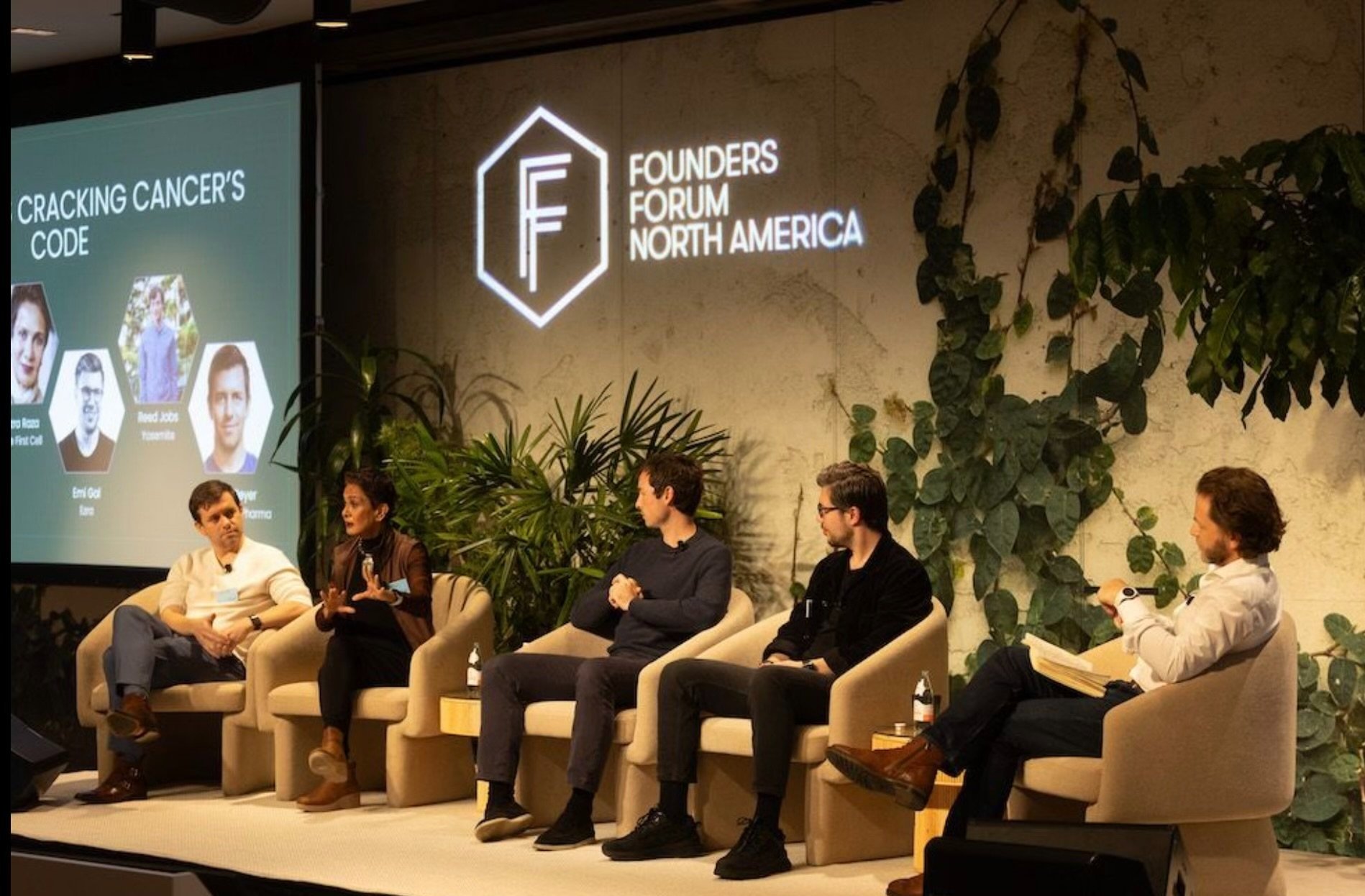Ever Closer to Cracking Cancer’s Code?
When will there be a speciality in preventive oncology just like we have lipidologists and endocrinologists and gastroenterologists all working today on deep lifestyle medicine and pre-emptive testing and intervention for avoidance of cardiovascular disease, diabetes & related diseases, and bowel & liver disease respectively?
In frank conversation with four pioneers cracking Cancer’s code
It was a privilege, as ever, to curate and chair another future of medicine panel for Founders Forum Group. This time for Founders Forum North America Summit in Brooklyn, New York. A notable thank you to Carolyn Dawson OBE and Brent Hoberman CBE for hosting us all.
Four pioneers came to speak on our main stage panel from near and far to illuminate the very bleeding edge of cancer prevention, detection and next generation therapeutics. All of which will make the life of a future oncologist very different. Reed Jobs of cancer dedicated deep tech fund Yosemite.co, Emi Gal of MRI cancer prevention pioneers Ezra, James Peyer, PhD of Cambrian Bio (who I stole from the Founders Forum Longevity round table, cancer being a disease of ageing no less) and last but not least the extraordinary Azra Raza from Columbia University an Oncologist of the decades long sacrifice, compassion and commitment like no other who I hold claim of being number one fan.
The boundaries will blur in which professionals do what for cancer as preventive oncology starts to integrate sophisticated and ever cheaper, highly specific tests and imaging for cancer that are commoditising as we speak. When will there be a speciality in preventive oncology just like we have lipidologists and endocrinologists and gastroenterologists all working today on deep lifestyle medicine and pre-emptive testing and intervention for avoidance of cardiovascular disease, diabetes & related diseases, and bowel & liver disease respectively? Looks like this is already happening driven by self-directed, self-paying people and it’s going spread wide and fast in the coming decade. Depending on who’s got the foresight and clout to pay.
For the times we won’t catch things early enough, broadly applicable immuno modulators and super targeted low toxicity small molecules against the very heart of cancer cells feel like a reality about to inflect into clinic. Orionis Biosciences with their Actikines and City of Hope with the anti caPCNA discovery are example beacons of a new hope for cancer.
Thanks to the FF team and these luminaries. My final take homes:
1. Find the first cell. In our practice we take a highly personalised view of this some of us want to know early, some don’t want to know at all. Some are wise to the risks of over investigation and finding positives but know early is better than late. We need to meet people where they are. Notable diagnostic technologies we counsel patients on routinely include CTCs, Whole Body MRI, ctDNA like Grail’s Galleri test, Datar’s CTC circulating tumour cell test, and of course all the well established best practice. It is easy to be over-convinced, overwhelmed and over-investigate causing more harm than good. LLMs will help a lot in future to scale the careful consultation and consideration of what to do when but however you approach it, finding and preventing the The First Cell (read Prof Azra Raza’s book) is key.
2. Lifestyle and prevention and ultra early detection will be a new speciality. Interestingly we know more and more every month that goes by on how important cellular metabolic health and youth is working to make the 1700 per-cancer cells we develop each day switch off or get eaten up by the immune system. Our thesis on ‘fitness’ at the inner cell level just as much as it may manifest in how swiftly you can run through the park, is the number one factor we all can control though it won’t prevent cancer in all of this was a preventive pill it would be the biggest pharmaceutical success in history. Indeed Cambrian Bio’s newest cancer treatment / secondary prevention candidate works on the same mTOR pathway as what healthy, fit cells do themselves!
3. AI will have to play a major part as it’s all getting super personalised. We’ve been keeping a close eye and speaking to the pioneers at DeepMind, Pi.ai, Nabla, Hippocratic.ai and new comers. There is a clear path to such tools enabling personalised oncology to be practically scaleable. But not quite yet.
4. Taylor Swift tickets vs Tailored Swift Tumour-Screening: if you’re 50+ spend $1,800 dollars on annual asteroid avoidance / bloods and imaging. Not on a typical Taylor Swift ticket. Both of you can afford it. Live life well but avoid being hit by asteroids. The big issue here being global accessibility and affordability where the health economics still don’t make sense.
Be well!

